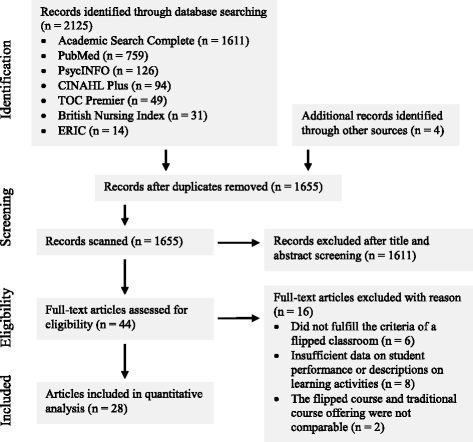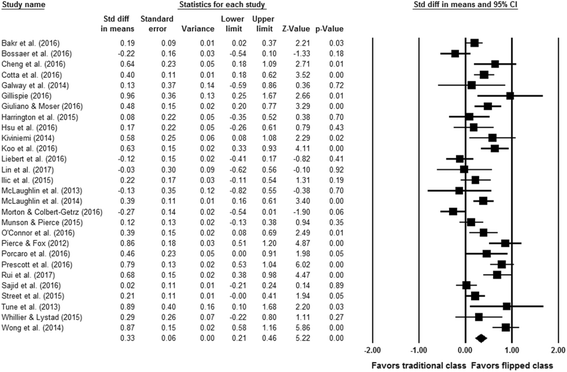Flipped classroom improves student learning in health professions education: a meta-analysis
- PMID: 29544495
- PMCID: PMC5855972
- DOI: 10.1186/s12909-018-1144-z
Flipped classroom improves student learning in health professions education: a meta-analysis
Abstract
Background: The use of flipped classroom approach has become increasingly popular in health professions education. However, no meta-analysis has been published that specifically examines the effect of flipped classroom versus traditional classroom on student learning. This study examined the findings of comparative articles through a meta-analysis in order to summarize the overall effects of teaching with the flipped classroom approach. We focused specifically on a set of flipped classroom studies in which pre-recorded videos were provided before face-to-face class meetings. These comparative articles focused on health care professionals including medical students, residents, doctors, nurses, or learners in other health care professions and disciplines (e.g., dental, pharmacy, environmental or occupational health).
Method: Using predefined study eligibility criteria, seven electronic databases were searched in mid-April 2017 for relevant articles. Methodological quality was graded using the Medical Education Research Study Quality Instrument (MERSQI). Effect sizes, heterogeneity estimates, analysis of possible moderators, and publication bias were computed using the COMPREHENSIVE META-ANALYSIS software.
Results: A meta-analysis of 28 eligible comparative studies (between-subject design) showed an overall significant effect in favor of flipped classrooms over traditional classrooms for health professions education (standardized mean difference, SMD = 0.33, 95% confidence interval, CI = 0.21-0.46, p < 0.001), with no evidence of publication bias. In addition, the flipped classroom approach was more effective when instructors used quizzes at the start of each in-class session. More respondents reported they preferred flipped to traditional classrooms.
Conclusions: Current evidence suggests that the flipped classroom approach in health professions education yields a significant improvement in student learning compared with traditional teaching methods.
Keywords: Flipped classroom; Flipped learning; Health professions education; Meta-analysis.
Conflict of interest statement
Ethics approval and consent to participate
Ethical approval and consent to participate are not applicable for this study.
Consent for publication
Consent for publication is not applicable for this work.
Competing interests
The authors declare that they have no competing interests.
Publisher’s Note
Springer Nature remains neutral with regard to jurisdictional claims in published maps and institutional affiliations.
Figures
References
-
- Horn MB, Staker HC. The rise of K-12 blended learning. San Mateo: Innosight Institute, Inc.; Retrieved from https://www.christenseninstitute.org/wp-content/uploads/2013/04/The-rise.... 2011.
-
- Giannakos MN, Krogstie J, Chrisochoides N. Proceedings of the computer science education research conference. 2014. Reviewing the flipped classroom research: reflections for computer science education; pp. 23–29.
-
- Karabulut-Ilgu A, Jaramillo Cherrez N, Jahren CT. A systematic review of research on the flipped learning method in engineering education. Br J Educ Technol. 2017; [cited 2017 Mar 29]. Available from: http://onlinelibrary.wiley.com/doi/10.1111/bjet.12548/full - DOI
-
- O’Flaherty J, Phillips C. The use of flipped classrooms in higher education: a scoping review. Internet High Educ. 2015;25:85–95. doi: 10.1016/j.iheduc.2015.02.002. - DOI
-
- Bergmann J, Sams A. Remixing chemistry class. Learn Lead Technol. 2008;36(4):24–27.
Publication types
MeSH terms
LinkOut - more resources
Full Text Sources
Other Literature Sources
Medical
Miscellaneous




